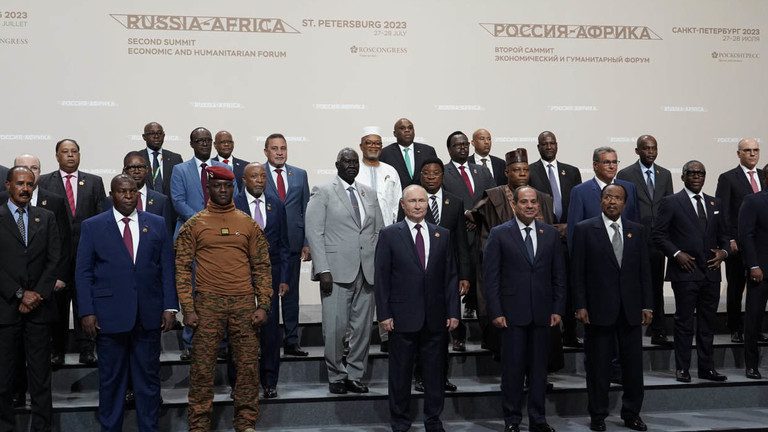Africa
US and UK news media portray the Russia-Africa meeting as a failure

The meeting in St. Petersburg appeared to be covered using cherry-picked talking points.
In their coverage of the Russia-Africa summit this week in St. Petersburg, British and American media outlets have embraced a set of similar talking points, focusing on the number of presidents in attendance, blaming Moscow for the demise of the Black Sea “grain deal,” and bringing up Wagner’s presence on the continent.
The two-day summit, which finished with a 74-point joint declaration committing collaboration in establishing a multipolar world order, was attended by representatives from 49 African countries. Western media, on the other hand, decided to focus on the number of presidents present and a comment from Kenyan ambassador Korir Sing’Oei, who tweeted last week that cancelling the grain deal was “a stab in the back at global food security prices.”
Russia decided not to renew the year-long agreement that allowed Ukraine to export 33 million tonnes of grain – primarily to the EU, Turkey, and China, with only a small amount reaching Africa – because the UN never allowed the export of Russian grain and fertiliser, which were blocked by Western shipping sanctions.
According to CBS News, the summit’s “small crowd” showed “Africa’s changing mood towards Moscow,” citing the views of one South African scholar.
“According to Russia’s own count, just 17 African heads of state attended the conference. That’s less than half of the 43 presidents that attended the inaugural Russia-Africa summit in 2019,” the American broadcaster stated, without mentioning that 49 African countries were represented at some level during the conference.
CNN declared in a headline, “Kremlin seethes over low summit turnout,” citing the “only 17” talking point. However, there was nothing to back up the accusation of “seething” – only another claim, lower down, that the Kremlin “fumed” about the “poor turnout” when alluding to Western pressure on the continent’s leaders.
“Any idea that Africa as a whole leans towards Russia is clearly mistaken,” said Washington Post columnist Adam Taylor, citing UN General Assembly votes as his measure. Taylor also mentioned “less than half of 43,” the grain agreement, and Sing’Oei.
Newsweek echoed the 17/43 ratio, but pointed out that 32 additional countries were represented by officials or ambassadors. Their headline, however, concentrated on the Polish-based Telegram channel Nexta’s parody of President Vladimir Putin’s handshake with Ethiopian Prime Minister Abiy Ahmed. Nexta promotes Ukrainian narratives and regime change in Belarus.
Time ran a bolder headline, ‘Why African Leaders Are Avoiding Putin’s Russia-Africa Summit,’ but never explained why. Instead, there were the talking points – grain deal, Sing’Oei, Wagner – and several quotes from Western think groups.
‘Putin Left Red-Faced As Few African Leaders Attend His Russia Summit,’ reported HuffPo, a surviving BuzzFeed spinoff. They, too, used 17/43, the grain agreement, and Sing’Oei and Wagner’s statement, but they also opted to emphasise that 49 African leaders attended US President Joe Biden’s’summit’ last December.
HuffPo also ascribed the statement “it seems the novelty has worn off” to the Russian publication Kommersant, despite the fact that it was a touch of editorialising from a tweet by BBC correspondent Steve Rosenberg.
The British press likewise ticked off the talking points: only 17 leaders, the grain agreement, Wagner’s “stab in the back” comment. The Guardian headlined, ‘Kremlin blames West for tiny number of leaders due at Russia-Africa summit,’ drawing comparisons to Biden’s December summit.
The Daily Mail’s headline of choice was ‘Fresh humiliation for Putin as he faces low turnout by African leaders,’ despite the fact that 32 more countries were represented at some level.
